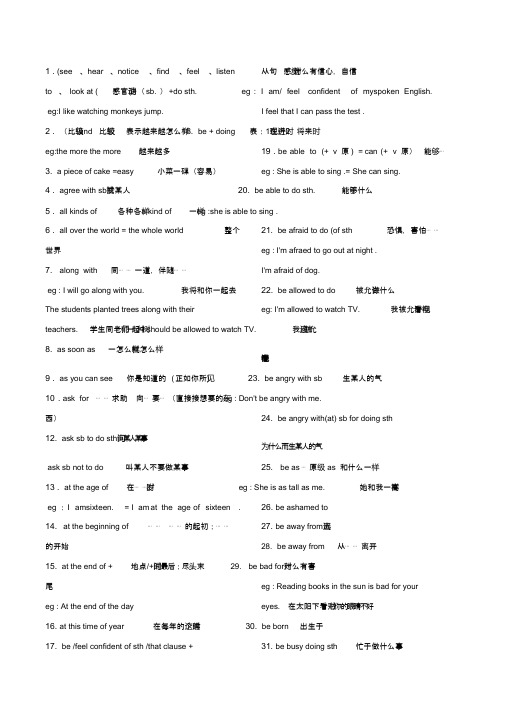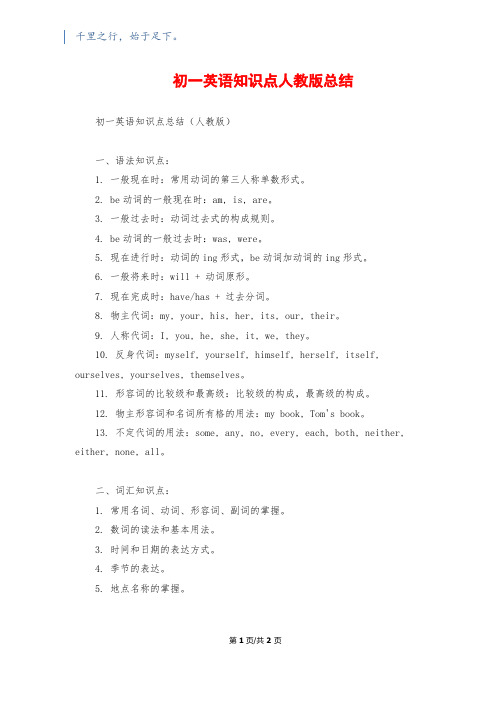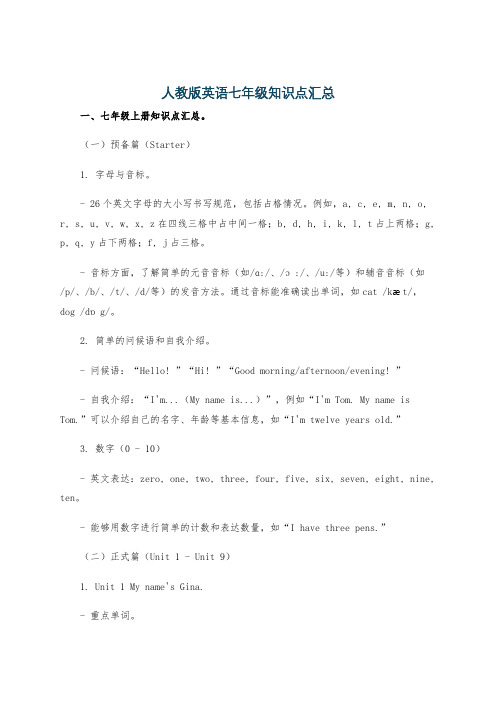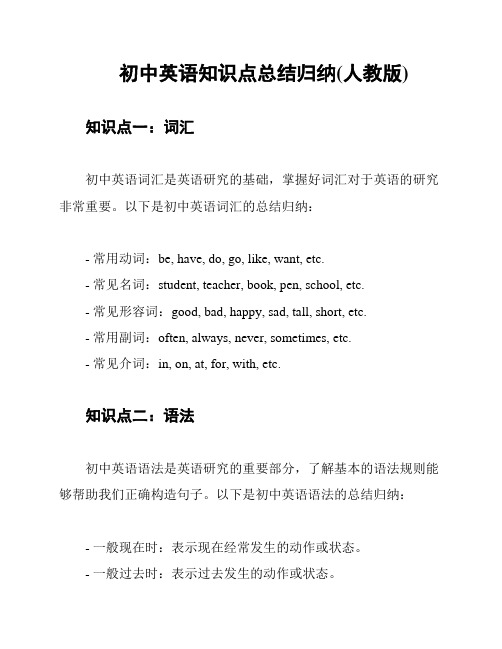(完整版)人教版初中英语知识点汇总
(完整版)人教版初中英语语法完整总结

1 . (see 、hear 、notice 、find 、feel 、listen 从句感觉/对什么有信心,自信to 、look at ( 感官动词)+(sb. )+do sth. eg : I am/ feel confident of myspoken English. eg:I like watching monkeys jump. I feel that I can pass the test .2 . (比较级and 比较级)表示越来越怎么样18. be + doing 表:1现在进行时2将来时eg:the more the more 越来越多19 . be able to (+ v 原) = can (+ v 原)能够⋯⋯3. a piece of cake =easy 小菜一碟(容易)eg : She is able to sing .= She can sing.4 . agree with sb赞成某人20. be able to do sth. 能够干什么5 . all kinds of 各种各样a kind of 一样e g :she is able to sing .6 . all over the world = the whole world 整个21. be afraid to do (of sth 恐惧,害怕⋯⋯世界eg : I'm afraed to go out at night .7. along with 同⋯⋯一道,伴随⋯⋯I'm afraid of dog.eg : I will go along with you. 我将和你一起去22. be allowed to do 被允许做什么The students planted trees along with their eg: I'm allowed to watch TV. 我被允许看电视teachers. 学生同老师们一起种树I should be allowed to watch TV. 我应该被允8. as soon as 一怎么样就怎么样许看电视9 . as you can see 你是知道的(正如你所见)23. be angry with sb 生某人的气10 . ask for ⋯⋯求助向⋯要⋯(直接接想要的东e g : Don't be angry with me.西)24. be angry with(at) sb for doing sth12. ask sb to do sth询问某人某事为什么而生某人的气ask sb not to do 叫某人不要做某事25. be as ⋯原级⋯as 和什么一样13 . at the age of 在⋯⋯岁时eg : She is as tall as me. 她和我一样高eg :I amsixteen. = I am at the age of sixteen . 26. be ashamed to14. at the beginning of ⋯⋯⋯⋯的起初;⋯⋯27. be away from远离的开始28. be away from 从⋯⋯离开15. at the end of + 地点/+时间最后;尽头;末29. be bad for对什么有害尾eg : Reading books in the sun is bad for youreg : At the end of the day eyes. 在太阳下看书对你的眼睛不好16. at this time of year 在每年的这个时候30. be born 出生于17. be /feel confident of sth /that clause + 31. be busy doing sth 忙于做什么事be busy with sth 忙于⋯⋯eg: Be late for class 上课迟到32. be careful 当心;小心48. be like 像⋯⋯eg : I'm like my mother .33. be different from ⋯⋯和什么不一样49. be mad at 生某人的气34. be famous for 以⋯⋯著名50. be made from 由⋯⋯制成( 制成以后看不见原35. be friendly to sb对某人友好材料)36. be from = come from 来自51. be made of 由⋯⋯制成( 制成以后还看得见原eg :He is from Bejing. 材料)He comes from Bejing. 52. be not sure 表不确定Is he from Bejing ? Does he come from Bejing ? 53. be on a visit to 参观37. be full of 装满⋯⋯的54. be popular with sb 受某人欢迎be filled with 充满55. be quiet 安静eg: The glass is full of water. 56. be short for ···的缩写The glass is filled with water. eg: 陶is short for 陶俊杰38. be glad+to+do/ 从句57. be sick in bed 生病在床39. be going to + v( 原)将来时58. be sorry to do sth be sorry for sb40. be good at(+doing) = do well in 在某方面eg : I am sorry for you.,善于⋯⋯59. be sorry to hear that善长41. be good for对什么有好处60. be sorry to trouble sbeg : Reading aloud is good for your English. eg : I am sorry to trouble you .42. be happy to do 很高兴做某事61. be strict in doing sth严于做某事43. be helpful to sb对某人有好处e g : He's strict in obeying rules .eg : Reading aloud is helpful to you. 大声朗62. be strict with sb对某人要求严格读对你有好处e g: Some students are not strict withExercising is helpful to your body.锻炼对你themselves.这些学生对自己不严格格某人严的身体有好处63. be strict with sb in sth 某方面对44. be in good health 身体健康64. be supposed to do 被要求干什么45. be in trouble处于困难中65. be sure 表确定eg : She is in trouble. They are in tronble. 66. be sure of doing sth对做某事有信心46. be interested in对某方面感兴趣47. be late for = come late to迟到eg: He is sure of winning. I amsure of learning I begin to go homeEnglish well. 78. between⋯and⋯两者之间67. be sure of sth对做某事有信心79. borrow sth from sb 向⋯⋯借⋯⋯eg: I'm sure of my head. (my teacher 我相信我lend sth to sb ( lend sb sth 借给⋯⋯什么东西(老师)eg : I borrowed a pen from him he lent a pen to的大脑68. be sure that sth对做某事有信心me. ( He lent me a pen. )eg: I'm suer that he can pass the test. 我相80. both = the same(as) = not different(from) 表相同信他能通过考试69. be sure to do sth 一定会做某事81. bother 打扰b other sb to do stheg: We are sure to pass the test. 我们一定会eg : I'm sorry to bother you ,but can you tell通过W e are sure to learn English well. me to way to the station .这次考试我怎么去车站你,但是你能告诉我们一定能学好英语我十分道歉打扰70. be terrified of + 名/动d oing 害怕⋯⋯The problem has been bothering mefor weeks. 这71. be terrified to do sth 害怕做某事了我几个周了扰个问困题72. be the same as ⋯和什么一样H e's bothering me to lend him money .73. be used to doing sth习惯做某事82. by the end of 到⋯⋯为止eg: My father is used to getting up early. 我83. call sb sth eg : We call him old wang. 爸爸习早He is used to sleeping in class. 他84. care 关心惯习惯上课睡觉e g : Don't you care about this country's future ?74. be worth doing值-得做什么什么不关心国家的未来你为75. be(feel) afraid to do sth 害怕做某事85. catch up with sb 赶上某人be afraid of sth 害怕某物86. chat with sb 和某人闲谈be afraid that丛句87. come in 进76. because+ 句子because of + 短语88. come over to过来eg : He was late because he had a headache. 89. come up with 提出He was late because of his headache . eg: Can you come up with a good idea? 你能想77. begin to do = start to do 开始做某事?法吗出一个好办start ⋯with ⋯=begin ⋯with ⋯以什么开始什么90. communicate with sb 和某人交流eg : Let's begin the game with the song. 91. consider + doing 考虑做什么eg : Why not consider going to lu zhou.为什 111. forget to do 没有做而忘了 forgetdoing 做么不考虑去泸州?了而又忘了92. dance to 随着⋯ ⋯ 跳舞eg: Don't forget to go home, I forget closing eg : She likes dancing to the music . 她喜欢随door .着音乐跳舞112. from ⋯ to ⋯ 从某某到某某93. decide to do sth 决定做某事 eg: From me to her94. do a survey of 做某方面的调查 113. get /have sth down做完,被(别人)做⋯95. do better in在⋯ ⋯ 方面做得更好eg: I have my hair cut.我理了发(头发被剪了)96. do wrong 做错T om got his bad tooth pulled out.汤母把他的97. Don't forget to do sth 不要忘了做某事坏牙拔掉了(被牙医拔掉了)98. Don't mind +doing / 从句 / 名词不要介意⋯ ⋯ 114. get a part-time job= find a part-time job99. each + 名(单)每一个⋯115. get along well with sb = get on well witheg : Each student has many books.sb 与某人相处得好每一个学生都有一些书116. get along with sb = get on with sb与某100. end up +doing 人相处101. enjoy +doing 喜欢117. get ready for = be ready for 为什么而准备 102. escape from从⋯ ⋯ 逃跑eg : I get ready for math exam. eg: The prisoners have escaped from the prison.I am ready for math exam.犯人从监狱里逃跑出来118. get sb in to trouble103. expect to do sth 期待做某事给某人制造麻烦,使某人陷入麻烦 104. fall down摔下来 fall off 从哪摔下来119. get sb to do sth105. fall in love with sb /sth 爱上什么 120. get ⋯ from ⋯ 从某处得到某物106. far from离某地远121. give a talk 做报告 eg: He is give a talk.eg : The school is far from my home. 122. give sth. to sb.= give sb. sth.107. find +it +adj. +to do 发现做某事怎么样给某人某物108. find sb/sth +adj.发现什么怎么样123. go fish 钓鱼go swimming 游泳eg : I find the book interesting.124. go on to do去做下一件事 go on doing 继109. finish 完成+doing (名词)续做这件事 110. fit to sb = be fit for sb适合某人125. go out away from =go out of 143. How about(+doing) = What about(+doing)126. go to school 上学(用于专业的)go to the 144. how do you like = what do you think of 你school 去学校(不一定是上学)对什么的看法127. good way to 好方法145. if : 是否=wether128. hate to do讨厌没做过的事eg: I don't know if (wether) I should go to thehate doing讨厌做过的事party . 我不知道我是否应该去参加晚会129. have a party for sb举办谁的晚会He don't know if (wether) we will arrive on time130. have a talk 听报告谈一谈t omorrow morning . 他不知道我们明天早上是否能131. have been doing现在完成进行时到达准时eg : You have been talking You have been 146. if : 如果,假如(全部接一般时态)+条件语sleeping since.态从句132. have been to ⋯( 地方)⋯⋯去过某过地方eg: I'll go to LuZhou if it does't rain. 假如have gone to ⋯(地方)去了某地还没回来州明天不下雨,我就去泸133. have fun +doing 玩得高兴I f they change the plan they will let me know.134. have sth to do 有什么事要做会让我知道的要改变计划,他们假如他们eg: I have a lot of homework to do. 我有很多I'll go to England ,if I have enough money next,我就要去英国的钱要做year . 如果我明年由足够家庭作业I have nothing to do. 我没什么事情做147. in one's opinion = sb think 某人认为135. have to do sth 必须做某事148. in some ways 在某些方面136. have trouble (problem) (in) doing sth 做149. in the end = finally(adv) 最后150. in the north of ⋯什么在什么的北方什么事情有麻烦137. have⋯time +doing ( north 北sowth 南west 西east东)138. have⋯(时间)⋯off 放⋯⋯假151. in the sun 在太阳下eg: I have month off 我请一个月得假152. increase 增加139. hear sb +do/doing 听见某人做某事/ 正在做eg : They've increased the piece of petrol by把石油价增加了3%某事3% . 他们140. help a lot 很大用处T he population has increased from 12 million141. help sb with sth \one's sth 帮助某人某事ten years ago to 18 million now .(某方面)help sb (to) do sth 帮助某人做某事153. instead of + (名)代替142. hope to do sth 希望做某事eg: I'd like an apple instead of a pear. 我想要苹果,而不要梨子166. keep +sb /sth +adj / 介词短语让什么保持I like English instead of math. 我喜欢英语而?什么样数学167. keep out 不让⋯⋯进入不喜欢154. introduce sb to sb 介绍某人给某人168. keep sb adj让⋯⋯保持⋯⋯introduce oneself 自我介绍e g: I want to keep mymother happy/ keep healthy.155. invite sb to do sth 邀请某人做某事保持高兴/健康156. It takes sb sometime to do sth 做某人花169. key to + 名词表示:某物的钥匙或某题的答间案掉某人多少时eg : It took me 5 minutes to do my homework . 170. key to ⋯key 可以是答题或钥匙It takes me half an hour to cook. anser to ⋯157. It's +adj +for sb to do sth对某人来说做171. laugh at ⋯取笑⋯⋯e g : Don't langh at others.某事怎么样158. It's +adj +to do 做某事怎么样W e langhed at the joke.159. It's +adj for sb对于某人来说怎么样172. learn by oneslfe 自学It's +adj of sb对某人来说太怎么样173. learn from sb 向某人学习160. It's +adj(for sb) to do (对某人来说)做eg: We should learn from Lei Feng.174. learn to do sth 学做某事某事怎么样It's +adj of sb to do sth对某人来说做某事太175. let sb do sth让某人做某事176. Let sb down让某人失望怎么样eg : It's nice of you to help mewith myEnglish. eg :We shouldn't let our farents down. 我们161. It's a good idea for sb to do sth对⋯⋯的父母失望我们该让不应是个好主意177. live from : 离某地远来说162. It's important to sb对某人来说很重要178. live in + 大地方/at + 小地方居住在某地eg: It's important to me. eg: I live in LuZhou.She lives at XuanTan .163. It's time to do sth = It's time for sth 179. look after = take care of 照顾照看间180. lose one's way谁迷路去做某事的时到了该eg : It's time to have class It's time for class. eg : Lose your way. 你迷路了该去上课了181. make a decision to do sth 决定做某事164. join = take part in 参加182. make friends with sb 和谁成为朋友165. just now刚才eg : I want to make friends with you. eg: He's not tall at all she doesn't junp far183. make it early 把时间定的早一点at all .184. make on exhibition of oneself让某人出洋202. not ⋯at all 一点都不相203. not ⋯either 表否定,也不185. make sb /n +n 使什么成为什么eg : I don't have sister, either. 我也没有姐eg : I made you my wife.姐186. make sb /sth +adj 使某人(某物)怎么样204. not ⋯until 直到⋯⋯才⋯⋯eg : You must made your bed clean. eg: I didn't sleep until my mother came back.187. make sb /sth adj 使某人/ 某物怎么样T he child didn't stop crying until I give her188. make sb do sth让某人做某事sugar.eg : I made him write. 我以前让他写205. offer / provide sb with sth给某人提供189. make up be made up of ( 被动语态)由⋯⋯206. offer sb sth ( offer sth to sb 提供什么组成东西给某人190. make⋯difference to ⋯eg : I offer you water .(I offer water to you . )191. mind sb to do mind one's doing 介意⋯⋯你提供水我给做什么207. on one's way to ⋯在谁去那的路上192. most + 名most of + 代208. on the one hand 一方面193. much too + 形容词o n the other hand 另一方面194. must be 一定209. on the phone = over the phone 用电话交谈195. need + 名词210. on time 准时i n time 及时196. need sb do sth 需要某人做某事211. one day =some day =someday 一天,有一197. need to do (实义动词)need do ( 情态动词)天198. no /neithr of hate to do no /neithr of hate 212. one of + 可数名词的复数形式doing 213. one to another 一个到另一个199. no + 名词214. over and over agin 一遍又一遍的200. not anymore = no more 再也不⋯⋯eg : He cleaned the floor over and over agin .eg: He didn't cry any more He cried no more. 他215. part-time job 兼职工作fall-time job 全再也不哭职工作201. not ⋯( 形、副)at all 216. pay for ⋯付⋯⋯钱p ay the bill 开钱,付钱217. please +do eg: Please give my best regards to your family.218. please help yourself请带我向你的家人我最好的问候219. pleased with sb I regard you as my friend. 我把你当作我的朋友220. pool into = pore into He shows little regard for others.221. practice +doing练习做某事人关心别他不爱222. prefer sth to sth 相对⋯⋯更喜欢⋯⋯226. remid sb about sth 提醒某人什么事eg : I prefer physics to chemisty. remid sb to do sth 提醒某人做某事物理eg : he remids me about cooking (He remids me在物理和化学中,我更喜欢prefer doing to sth 更喜欢去做⋯不愿意去做⋯to cook. 他提醒我做饭eg: He prefers riding a bike to diving. 227. remid sb of sth 使某人想起什么,不开小车e g : The pictures remind me of my school days.骑自行车他更喜欢prefer to do sth rather than do sth 宁愿做⋯这照片使我想起了我的学校也不愿T he wor ds that (which) the teacher talke toeg: My unde prefers to buy a now car rather than remind me of my mother.repaiv the used one. 我叔叔更喜欢买新的车,也228. return sth to sb还什么东西给某人不去修旧车229. say to oneself对自己说prefer sb not to do sth 更愿意⋯230. say to sb对某人说eg: I prefer her not to come 我不喜欢她不来231. sb spend somemoney on sth 花了多少钱在某223. pretend to do sth 装着去做什么事上pretend that 从句232. sb spend sometime with sb 花了多少时间陪eg : The two cheats pretended to be working very谁hard .这两个骗子装着努力工作233. sb spend sometime(in) doing sth 花了多少He pretended that he did not know the answer .时间做某事他装着不知道答案234. sb with sb +is sb and sb +are224 . rather ⋯than 宁可⋯⋯也不⋯⋯235. see sb do 看见某人做过某事eg : I would rather be a doctor than a teacher. see sb doing 看见某人正在做某事236. seem to do/be +adj显得怎么样我愿肯当医生,也不当老师He likes dogs rather than cats. 他喜欢狗,不eg : You seem to be tired .You seem to be happy. 猫237. send +sb sth 送给某人某物喜欢225. regard ⋯as 把⋯⋯当作⋯⋯238. send⋯to ⋯把什么寄到哪里去?to one's surprise 令某人惊奇239. shock 使⋯⋯震惊253. take classes 上课eg : Oh , It's only you ! You give me a shock . 254. take sb to 把某人带去啊,是你呀!吓我一跳eg : I take you to the hospital.240. show sb sth 向某人展示某物255. take walks = take a walk =go for a walk eg : I show her the book.散步241. show sb sth = show sth to sb 拿什么东西256. ①talk to对谁说e g : I talk to you .给某人看②talk with 和谁说eg : I talk with him .eg: Show me your pen.= Show your pen to me. ③talk of谈到eg : we talked of you.242. show sth to sb 向某人展示某物④talk about谈论关于⋯⋯eg : I show the book to her. 257. talk with sb 和某人说话243. some⋯others ⋯一些⋯⋯另一些⋯⋯258. teach sb sth 教某人做某事244. start ⋯with ⋯从⋯⋯开始259. tell sb do sth 告诉某人做某事begin ⋯with ⋯从⋯⋯开始260. tell sb sth tell sb that245. stay away from远离⋯⋯丛句tell sb not to do sth tell a storyeg : We're told to stay away from the animals 261. tell sb sth 告诉某人某事whe visiting the zoo. 262. tell sb to do sth 告诉某人做什么离动物tell sb not to do sth 告诉要远某人不要做什么参观当我们z oo时,我们If you want to lose weight you'd better stay 263. tell ⋯from⋯auay from the sweet food. 264. thank you for +doing离甜食265. the same + 名词(doing)+as ⋯⋯如果你想减肥,你最好远246. stop doing 停下正在做的事266. the same⋯( 名) ⋯as247. stop sb from doing sth 阻止某人做某事as⋯(adj adv) ⋯as 相同248. stop sb(from) doing 阻止某人做某事267. the way to do sth =the way of doing sth 249. stop to do 停下正在做的事去做下一件事做某方面的方法the way to + 地方去哪的路250. such + 名这样,这种 e g :Do you know the way to learn English.251. suit sb 适合某人Do you know the way of learning English.252. surprise sb 使某人惊奇268. the way to ⋯(地点)到哪的269. too ⋯to ⋯太怎样而不能⋯能⋯⋯⋯adj +enough to 足够so⋯that +丛句eg: He is too young to go to school.= He is so young that he can't go to schoolHe is old enough to go to school .=He is so old that he can go to school .270. transalte ⋯⋯into ⋯⋯把什么翻译成什么eg : Trasalte English into chinese .271. travel with sb 和某人去旅游272. try one's best to do sth 尽某人最大的努力去做某事eg: I will try my best to learn English well.273. try to do sth 想干什么,但没成功try doing sth 想干什么,已经做过了eg :He tried to climb. 他想爬上去( 但没成功) He tried climbing. 他想爬上去( 已经做过了)274. try ⋯试衣服have a try试一下275. turn down 开小←→turn up 开大276. turn off 关上←→turn o n 打开open 拆开277. upside down 倒着278. visit to ⋯参观某个地方279. wait for sb 等某人。
初一英语知识点人教版总结

千里之行,始于足下。
初一英语知识点人教版总结初一英语知识点总结(人教版)一、语法知识点:1. 一般现在时:常用动词的第三人称单数形式。
2. be动词的一般现在时:am, is, are。
3. 一般过去时:动词过去式的构成规则。
4. be动词的一般过去时:was, were。
5. 现在进行时:动词的ing形式,be动词加动词的ing形式。
6. 一般将来时:will + 动词原形。
7. 现在完成时:have/has + 过去分词。
8. 物主代词:my, your, his, her, its, our, their。
9. 人称代词:I, you, he, she, it, we, they。
10. 反身代词:myself, yourself, himself, herself, itself, ourselves, yourselves, themselves。
11. 形容词的比较级和最高级:比较级的构成,最高级的构成。
12. 物主形容词和名词所有格的用法:my book, Tom's book。
13. 不定代词的用法:some, any, no, every, each, both, neither, either, none, all。
二、词汇知识点:1. 常用名词、动词、形容词、副词的掌握。
2. 数词的读法和基本用法。
3. 时间和日期的表达方式。
4. 季节的表达。
5. 地点名称的掌握。
第1页/共2页锲而不舍,金石可镂。
三、句型知识点:1. 陈述句的基本句型:主语+谓语+宾语。
2. 疑问句的基本句型:助动词/系动词/情态动词+主语+动词?3. 否定句的基本句型:主语+助动词/be动词/情态动词+not+动词原形。
4. be动词的疑问句和否定句的构成。
5. 以What/Who/Where/When/How开头的特殊疑问句的构成。
四、阅读技巧和写作要点:1. 阅读理解题的解题技巧。
2. 写作要点:选择合适的词汇和句型,注意语法和拼写错误,组织结构和内容的连贯性。
初中英语人教版八年级知识点详细汇总

初中英语人教版八年级知识点详细汇总一、语法重点1. **时态**-一般现在时:用于描述经常发生的动作或状态。
-现在进行时:表示正在进行的动作。
-一般过去时:描述过去发生的动作或状态。
-过去进行时:表示过去某个时间点正在进行的动作。
2. **代词**-人称代词:主格和宾格的使用。
-物主代词:形容词性物主代词和名词性物主代词。
-反身代词:表示动作反射回到动作执行者身上。
3. **介词**-表示时间的介词:at, on, in。
-表示地点的介词:at, on, in。
-其他常用介词:with, by, for, of, about。
4. **情态动词**- can/could:表示能力或许可。
- may/might:表示可能性或许可。
- must:表示必须或强烈推测。
- should/ought to:表示建议或义务。
5. **句型结构**-一般疑问句:使用助动词do/does或be/am/is/are构成。
-特殊疑问句:使用疑问词who, what, where, when, why, how等。
-否定句:使用助动词do/does或be/am/is/are后跟not。
二、词汇与短语1. **基础词汇**-常见名词:school, teacher, student, family, friend等。
-常见动词:go, come, have, make, play等。
-常见形容词:big, small, happy, sad, easy, difficult等。
2. **短语**-动词短语:want to do, have to do, start to do等。
-介词短语:in the morning, on the weekend, at the moment等。
-固定搭配:take care of, look forward to, be good at等。
3. **单元重点短语**(以Unit1为例)- go on vacation 去度假- stay at home 呆在家- go to the mountains 上山/进山- go to the beach 到海边去- visit museums 参观博物馆- quite a few 相当多- taste good 尝起来味道好- have a good time 玩的开心- feel like 感觉像……/想要- go shopping 去购物- walk around 绕……走- buy sth for ab./ buy sb. sth 为某人买某物以上即为初中英语人教版八年级知识点的详细汇总,希望对你的学习有所帮助。
(完整版)人教版初中英语知识点汇总

初中英语知识点汇总初一年级(上)【知识梳理】I. 重点短语1. Sit down2. on duty3. in English4. have a seat5. at home6. look like7. look at8. have a look9. come on10. at work11. at school12. put on13. look after14. get up15. go shoppingII. 重要句型1. help sb. do sth.2. What about…?3. Let’s do sth.4. It’s time to do sth.5. It’s time for …6. What’s…? It is…/ It’s…7. Where is…? It’s….8. How old are you? I’m….9. What class are you in? I’m in….10. Welcome to….11. What’s …plus…? It’s….12. I think…13. Who’s this? This is….14. What can you see?I can see….15. There is (are) ….16. What colour is it (are they)? It’s (They’re)…17. Whose …is this? It’s….18. What time is it? It’s….III. 交际用语1. Good morning, Miss/Mr….2. Hello! Hi!3. Nice to meet you. Nice to meet you, too.4. How are you? I’m fine, thank you/thanks. And you?5. See you. See you later.6. Thank you! You’re welcome.7. Goodbye! Bye!8. What’s your name? My name is ….9. Here you are. This way, please.10. Who’s on duty today?11. Let’s do.12. Let me see.IV. 重要语法1. 动词be的用法;2. 人称代词和物主代词的用法;3. 名词的单复数和所有格的用法;4. 冠词的基本用法;5. There be句型的用法。
人教版英语七年级知识点汇总

人教版英语七年级知识点汇总一、七年级上册知识点汇总。
(一)预备篇(Starter)1. 字母与音标。
- 26个英文字母的大小写书写规范,包括占格情况。
例如,a, c, e, m, n, o, r, s, u, v, w, x, z在四线三格中占中间一格;b, d, h, i, k, l, t占上两格;g, p, q, y占下两格;f, j占三格。
- 音标方面,了解简单的元音音标(如/ɑ:/、/ɔ:/、/u:/等)和辅音音标(如/p/、/b/、/t/、/d/等)的发音方法。
通过音标能准确读出单词,如cat /kæt/,dog /dɒg/。
2. 简单的问候语和自我介绍。
- 问候语:“Hello! ”“Hi! ”“Good morning/afternoon/evening! ”- 自我介绍:“I'm...(My name is...)”,例如“I'm Tom. My name is Tom.”可以介绍自己的名字、年龄等基本信息,如“I'm twelve years old.”3. 数字(0 - 10)- 英文表达:zero, one, two, three, four, five, six, seven, eight, nine, ten。
- 能够用数字进行简单的计数和表达数量,如“I have three pens.”(二)正式篇(Unit 1 - Unit 9)1. Unit 1 My name's Gina.- 重点单词。
- name(名字),nice(美好的),to(不定式符号,无实义),meet(遇见),too(也),your(你的;你们的),his(他的),her(她的)。
- 重点句型。
- “What's your name? ”“My name's...(I'm...)”用于询问和回答名字。
- “Nice to meet you. ”“Nice to meet you, too.”用于初次见面时的问候。
人教版七年级英语各单元知识点

人教版七年级英语各单元知识点Unit 1 My name's Gina.一、重点单词。
1. name:名字,可数名词。
例如:My name is Tom.2. nice:令人愉快的;宜人的。
如:Nice to meet you.(很高兴见到你。
)3. to:常用于动词原形前,表示目的或意图,也可用于一些固定搭配中,如Nice to meet you.4. meet:遇见;相逢。
5. too:也;又;太。
例如:I'm fine, too.(我也很好。
)6. your:你的;你们的,形容词性物主代词,后面需接名词,如your name(你的名字)。
7. his:他的,形容词性物主代词,如his book(他的书)。
8. her:她的,形容词性物主代词,例如her pen(她的钢笔)。
二、重点短语。
1. my name:我的名字。
2. your name:你的名字。
3. first name:名字(在英语中,名字在前,姓氏在后,first name就是指个人的名字)4. last name:姓氏(也可表达为family name)5. nice to meet you:很高兴见到你(回答常用Nice to meet you, too.)三、重点句型。
1. —What's your name?(你叫什么名字?)—My name's Gina.(我的名字是吉娜。
)2. —Nice to meet you.(很高兴见到你。
)—Nice to meet you, too.(我也很高兴见到你。
)3. —What's his name?(他叫什么名字?)—His name's Tom.(他的名字是汤姆。
)4. —What's her name?(她叫什么名字?)—Her name's Mary.(她的名字是玛丽。
)Unit 2 This is my sister.一、重点单词。
初中英语知识点总结归纳(完整版)人教版

初中英语知识点总结归纳(完整版)人教版初中英语知识点总结归纳(完整版)人教版每一阶段的学习都有要求我们掌握的基础知识,那么关于初中英语的知识点都有哪些呢以下是小编准备的一些初中英语知识点总结归纳(完整版),仅供参考。
简单句的五种基本句型1.“主语+谓语”(即“主谓”句型)例:They arrived in Harbin yesterday morning.分析:“they”(主语)“arrived”(谓语)。
2.“主语+谓语+宾语”(即“主谓宾”句型)例:I study English.分析:“I”(主语)“study”(谓语动作)“English”(宾语即动作涉及的对象)。
3.“主语+谓语+间接宾语+直接宾语”(即“主谓双宾”句型)例:Our teacher taught us English.分析:“our teacher”(主语)“教”(谓语动作)“us”(间接宾语)“English”(直接宾语)。
4.“主语+谓语+宾语+宾语补足语”(即“主谓宾宾补”句型)例:He asked her to go there.分析:“he”(主语)“asked”(谓语动作)“her”(宾语即动作涉及的对象)“to go there”(补语—补充说明宾语做什么)。
5.“主语+系动词+表语”(即“主系表”句型)常用的系动词有be, keep,lie, remain, stand, become, fall, get, go, grow, turn, look, feel, seem, smell, sound, taste,等。
例:I am a teacher.分析:“I”(主语)“am”(系动词)“a teacher”(表语—即表明主语的身份)。
初中英语八种基本时态1. 一般现在时概念: 表示经常发生的动作或经常存在的状态。
常和 always , often , usually , sometimes , every day 等表时间的状语连用。
初中英语知识点总结归纳(人教版)

初中英语知识点总结归纳(人教版)知识点一:词汇初中英语词汇是英语研究的基础,掌握好词汇对于英语的研究非常重要。
以下是初中英语词汇的总结归纳:- 常用动词:be, have, do, go, like, want, etc.- 常见名词:student, teacher, book, pen, school, etc.- 常见形容词:good, bad, happy, sad, tall, short, etc.- 常用副词:often, always, never, sometimes, etc.- 常见介词:in, on, at, for, with, etc.知识点二:语法初中英语语法是英语研究的重要部分,了解基本的语法规则能够帮助我们正确构造句子。
以下是初中英语语法的总结归纳:- 一般现在时:表示现在经常发生的动作或状态。
- 一般过去时:表示过去发生的动作或状态。
- 一般将来时:表示将来将要发生的动作或状态。
- 现在进行时:表示现在正在进行的动作。
- 过去进行时:表示过去某个时间段正在进行的动作。
知识点三:阅读理解初中英语阅读理解是培养阅读能力和理解能力的重要方式。
以下是初中英语阅读理解的总结归纳:- 阅读短文时,要注意关键词和上下文的逻辑关系。
- 同义词与反义词的理解。
- 根据文章的语境推断词语的含义。
- 根据问题,寻找文章中的相关信息。
知识点四:写作技巧初中英语写作技巧对于提高英语表达能力非常重要。
以下是初中英语写作技巧的总结归纳:- 写作时要注意语法和拼写的准确性。
- 选择恰当的词汇和句子结构。
- 使用连词和过渡词使文段衔接自然。
- 多读英语文章,研究优秀的写作范例。
以上是初中英语知识点的总结归纳,希望对你的学习有所帮助!。
- 1、下载文档前请自行甄别文档内容的完整性,平台不提供额外的编辑、内容补充、找答案等附加服务。
- 2、"仅部分预览"的文档,不可在线预览部分如存在完整性等问题,可反馈申请退款(可完整预览的文档不适用该条件!)。
- 3、如文档侵犯您的权益,请联系客服反馈,我们会尽快为您处理(人工客服工作时间:9:00-18:30)。
初中英语知识点汇总初一年级(上)
【知识梳理】
I. 重点短语
1. Sit down
2. on duty
3. in English
4. have a seat
5. at home
6. look like
7. look at
8. have a look
9. come on
10. at work
11. at school
12. put on
13. look after
14. get up
15. go shopping
II. 重要句型
1. help sb. do sth.
2. What about…?
3. Let’s do sth.
4. It’s time to do sth.
5. It’s time for …
6. What’s…? It is…/ It’s…
7. Where is…? It’s….
8. How old are you? I’m….
9. What class are you in? I’m in….
10. Welcome to….11. What’s …plus…? It’s….
12. I think…
13. Who’s this? This is….
14. What can you see?I can see….
15. There is (are) ….
16. What colour is it (are they)? It’s (They’re)…
17. Whose …is this? It’s….
18. What time is it? It’s….
III. 交际用语
1. Good morning, Miss/Mr….
2. Hello! Hi!
3. Nice to meet you. Nice to meet you, too.
4. How are you? I’m fine, thank you/thanks. And you?
5. See you. See you later.
6. Thank you! You’re welcome.
7. Goodbye! Bye!
8. What’s your name? My name is ….
9. Here you are. This way, please.
10. Who’s on duty today?
11. Let’s do.
12. Let me see.
IV. 重要语法
1. 动词be的用法;
2. 人称代词和物主代词的用法;
3. 名词的单复数和所有格的用法;
4. 冠词的基本用法;
5. There be句型的用法。
【名师讲解】
1.in/on
在表示空间位置时,in表示在某个空间的范围以内,on表示在某一个物体的表面之上。
例如:There is a bird in the tree. 树上有只鸟。
There is a picture on the wall. 墙上有张图。
2. this/that/these/those
(1)this常常用来指在时间、地点上更接近讲话人的人和事,these是this的复数形式。
that常常用来指在时间、地点上离讲话人更远一点的人和事,those时that的复数形式。
例如:You look in this box and I’ll look in that one over there.你看看这个盒子,我去看那边的那个盒子。
I want this car, not that car. 我想要这辆小汽车,不是那一辆。
Take these books to his room, please. 请把这些书拿到他房间去。
This is mine; that’s yours. 这个是我的,那个是你的。
These are apples; those are oranges. 这些是苹果,那些是橘子。
(2)在打电话的用语中,this常常指的是我,that常常指的是对方。
例如:
This is Mary speaking. Who’s that? 我是玛丽。
你是谁?
3. There be/ have
There be "有",其确切含意为"某处或某时存在某人或某物。
"其结构是:There be + 某人或某物+ 表示地点或时间的状语。
There be 后面的名词实际上是主语,be 动词的形式要和主语在数上保持一致,be动词后面的名词是单数或不可数名词时用is,名词是复数时用are。
例如:(1) There is a big bottle of coke on the table. 桌上有一大瓶子可乐。
(2) There is a doll in the box. 那个盒子里有个娃娃。
(3) There are many apples on the tree. 那树上有许多苹果。
总之,There be结构强调的是一种客观存在的"有"。
have表示"拥有,占有,具有",即:某人有某物(sb. have / has sth.)。
主语一般是名词或代词,与主语是所属关系。
例如:
(4) I have two brothers and one sister.我有两个兄弟,一个姐姐。
(5) That house has four rooms.那所房子有四个房间。
4. look/ see/ watch
(1)look 表示“看、瞧”,着重指认真看,强调看的动作,表示有意识地注意看,但不一定看到,以提醒对方注意。
,如:
Look! The children are playing computer games. 瞧!孩子们在玩电脑游戏。
Look! What’s that over there? 看!那边那个是什么?
单独使用是不及物动词,如强调看某人/物,其后接介词at,才能带宾语,如:
He’s looking at me。
他正在看着我。
(2)see强调“看”的结果,着重的是look这个动作的结果,意思是“看到”,see是及物动词,后面能直接跟宾语。
如:
What can you see in the picture? 你能在图上看到什么?
Look at the blackboard. What did you see on it?看黑板!你看到了什么?
(3)watch“观看,注视”,侧重于场面,表示全神贯注地观看、观察或注视某事务的活动,强调过程,常用于“看电视、看足球、看演出”等。
如:
Yesterday we watched a football match on TV.昨天我们从电视上看了一场足球比赛。
4. put on/ / in
put on意为“穿上,戴上”。
主要指“穿上”这一动作, 后面接表示服装、鞋帽的名词。
in 是介词,表示“穿着”强调状态。
在句中可以做定语、标语和状语。
如:
It’s cold outside, put on your coat. 外面冷,穿上你的外衣。
He puts on his hat and goes out. 他戴上帽子,走了出去。
The woman in a white blouse is John’s mother.穿白色衬衣的那个妇女是John的妈妈。
5. house/ home/family
house :“房子”,指居住的建筑物; Home: “家”,指一个人同家人共同经常居住的地方; Family: “家庭“,“家庭成员”。
例如:Please come to my house this afternoon. 今天下午请到我家来。
He is not at home. 他不在家。
My family all get up early. 我们全家都起得很早。
6. fine, nice, good, well
四者都可用作形容词表示"好"之意,但前三者既可作表语又可作定语,而后者仅用作表语。
主要区别在于:
(1) fine指物时表示的是质量上的"精细",形容人时表示的是"身体健康",也可以用来指"天气晴朗"。
例如:Your parents are very fine. 你父母身体很健康。
That's a fine machine.那是一台很好的机器It's a fine day for a walk today.今天是散步的好时候。
(2)nice主要侧重于人或物的外表,有"美好","漂亮"的意思,也可用于问候或赞扬别人。
例如:Lucy looks nice. 露西看上去很漂亮。
These coats are very nice. 那些裙子很好看。
Nice to meet you. 见到你很高兴。
It's very nice of you. 你真好。
